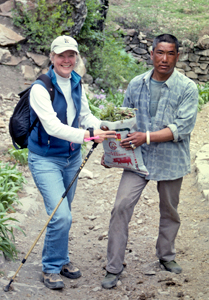 Collaboration is the hallmark of the Garden's research program. Without exception, work is conducted in partnership with institutions in host nations - the overall goal is to strengthen their institutions and form partnerships that serve the needs of all. In several countries of exceptional biological importance - Bolivia, Costa Rica, Ecuador, Paraguay, Peru, Madagascar and Vietnam - the garden maintains resident curators who live and work there.
Collaboration is the hallmark of the Garden's research program. Without exception, work is conducted in partnership with institutions in host nations - the overall goal is to strengthen their institutions and form partnerships that serve the needs of all. In several countries of exceptional biological importance - Bolivia, Costa Rica, Ecuador, Paraguay, Peru, Madagascar and Vietnam - the garden maintains resident curators who live and work there.
Developing nations are urgently seeking the tools to address their conservation concerns, but the world has been slow to respond. Despite the best intentions of many organizations and governments, conservation as a concerted, worldwide agenda is still in its infancy.
In response, the Garden's Center for Conservation and Sustainable Development is providing leadership. The Center fosters support and cooperation among partner institutions, government agencies, and non-government organizations. By building on the Garden's expertise, resources and influence, the Center promises urgently needed hope for the future.